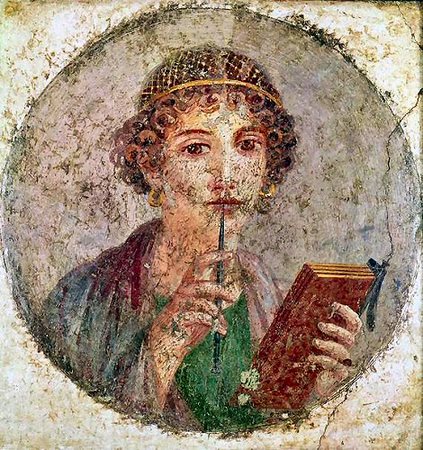And none other than Sappho of Lesbos! She was a lyric poet born sometime between 630 and 612 BCE, and it is said that she died around 570 BCE, but little is known for certain about her life. The bulk of her poetry, which was well-known and greatly admired through much of antiquity, has been lost, but her immense reputation has endured through surviving fragments.
So you can have an idea, the only contemporary source for Sappho's life is her own poetry, and scholars are skeptical of reading it biographically. Later biographical accounts are also considered unreliable. According to the Parian Marble (a Greek chronology, covering the years from 1582 BC to 299 BC, inscribed on a stele), Sappho was exiled to Sicily sometime between 604 BCE and 594 BCE and Cicero records that a statue of her stood in the town-hall of Syracuse. Again, since there is no explicit record of this, it is usually assumed that Sappho returned from exile at some point and that she spent most of her life in Lesbos.
Sappho's poetry centers on passion and love for various people and both sexes. The word "lesbian" derives from the name of the island of her birth, Lesbos, while her name is also the origin of the word "sapphic"; neither word was applied to female homosexuality until the 19th century.
She is also remembered for being headmistress of a girls' finishing school, but this also hasn't been confirmed by historians. Nevertheless, she was highly esteemed by other Greek poets in ancient history, and an epigram by Plato in the Anthologia Palatina states:
Some say the Muses are nine: how careless!
Look, there's Sappho too, from Lesbos, the tenth.
So you can have an idea, the only contemporary source for Sappho's life is her own poetry, and scholars are skeptical of reading it biographically. Later biographical accounts are also considered unreliable. According to the Parian Marble (a Greek chronology, covering the years from 1582 BC to 299 BC, inscribed on a stele), Sappho was exiled to Sicily sometime between 604 BCE and 594 BCE and Cicero records that a statue of her stood in the town-hall of Syracuse. Again, since there is no explicit record of this, it is usually assumed that Sappho returned from exile at some point and that she spent most of her life in Lesbos.
Sappho's poetry centers on passion and love for various people and both sexes. The word "lesbian" derives from the name of the island of her birth, Lesbos, while her name is also the origin of the word "sapphic"; neither word was applied to female homosexuality until the 19th century.
She is also remembered for being headmistress of a girls' finishing school, but this also hasn't been confirmed by historians. Nevertheless, she was highly esteemed by other Greek poets in ancient history, and an epigram by Plato in the Anthologia Palatina states:
Some say the Muses are nine: how careless!
Look, there's Sappho too, from Lesbos, the tenth.
~Ally

 RSS Feed
RSS Feed